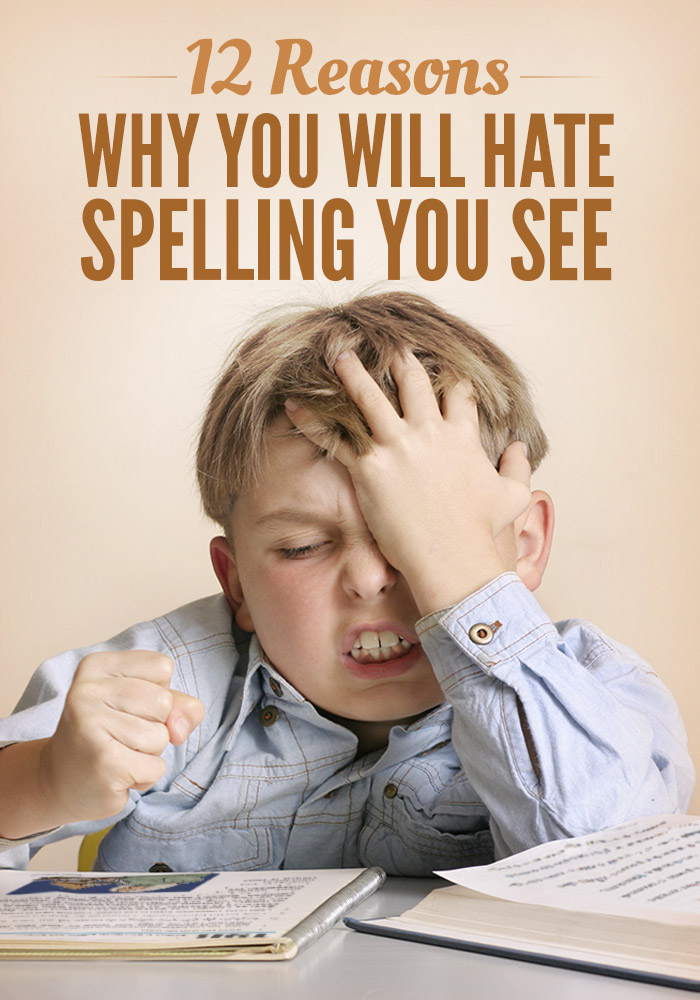12 Reasons Why You Will Hate Spelling You See

We think Spelling You See is the best spelling program out there. Just a smidgen of bias, maybe? Maybe, but it’s based on solid educational research and follows the way people learn language. It has proven results with students from a range of ages and abilities. It’s different, but it’s not difficult. But we’re willing to admit that it may not be for everyone. If you can strongly relate to any of the following statements, you might want to consider another choice.
12 Reasons Why You Will Hate Spelling You See
1) There Are No Spelling Lists
If your idea of a spelling lesson is rote memorization of a list of twenty loosely-related words, presented out of context, that are written and regurgitated over and over in hopes of drumming them into long-term memory, then you will be disappointed.
2) There Are No Tests
Why? Because tests are a great measure of a student’s short-term list memory, but not of whether they are imprinting the proper spelling of a word into long-term visual memory. Think of your grocery list from the week of April 27, 2005. You can’t? That’s because list memory is short term and is regularly overwritten like an old computer file. You’ll know your student is learning when you see ongoing improvement in all of their written work and an increased number of correct words in dictation.
Related blog post: 3 Reasons Why Spelling Tests Don’t (Always) Work
3) It Doesn’t Teach Rules
Fair enough, it doesn’t. It also, therefore, doesn’t need to spend all that time teaching all the exceptions to those “rules.” English doesn’t play nicely with spelling rules or phonics once you’ve moved beyond consonant-short vowel-consonant words, and some students can get extremely frustrated and discouraged by this: “Whaddya mean, it’s wrong? I applied the rule!” As students progress through the program and are already strong in their skill development, they’ll be introduced to appropriate rules in a natural progression.
4) The Reading Level Is Too Easy
Yes, but that’s on purpose. Encoding (spelling and writing) and decoding (reading) are two very different processes. It’s quite possible for a student to be an outstanding, advanced reader, but a terrible speller. We don’t want students to struggle with decoding while they’re focusing in on their spelling.
5) Time’s Up, But We’re So Close to Finished So We Don’t Want to Stop
We admire your dedication, but there’s a reason we advise you to set a timer and stop after ten minutes. That’s about how long we can really focus on a task, especially when we’re kids. So when the timer goes off, pencils down. Count the number of correct words. As your student gains more spelling fluency and confidence, this number will go up.
6) My Kid is Too Old for the Program, So It’s Too Late to Start Now
A cool fact about Spelling You See is that it can improve spelling fluency for most struggling spellers, regardless of reading level or age. Our short rhymes and passages are intended to be easy reading but are still remarkably effective at developing long-term visual memory of proper spelling. If you have a unique situation (and who doesn’t?), feel free to contact a curriculum consultant in customer service or sales for a custom recommendation.
7) It’s the Same Passage Every Day for a Whole Week
That’s true. Research shows that repeated reading and repeated writing of passages cement proper spelling in visual memory. Have you ever written a word and thought, “That just doesn’t look right…”? That’s your visual memory at work. When students can close their eyes and “see” the proper spelling, that’s what puts the “See” into “Spelling You See.” Plus our passages include interesting, factual content that all ages can appreciate. They’ve even been known to spark an interest in new topics!
8) Students Don’t Have to Correct Their Mistakes or Write Misspelled Words Ten Times or Anything!
When a word is spelled incorrectly in copywork, you’ll ask the student to erase it and copy it or write it correctly. It’s important to address misspellings immediately so that there’s no time for that misspelling to get into long-term memory. If your level involves a second dictation, encourage your student to write a problem word several different ways and “see” which one looks right (hence the name “visual” memory). As for writing missed words multiple times, that just creates negativity in the student as it can be seen as a punishment. We want to keep learning positive and relaxed and as much fun as possible.
9) It’s Suspiciously Easy
It really is, isn’t it? It seems too simple to work. Each activity involved is developed to take no more than 10 minutes, since that’s about how long our brains can pay attention to something. And we’re serious about not wanting our students to be stressed out. Stress short-circuits learning. So we provide lists of letter chunks to be identified in each lesson, and we encourage you to provide as much help as needed during dictation (we’ll provide direction on how to help appropriately, don’t worry).
10) Nobody Needs to Write by Hand Anymore; Keyboarding Skills Are Far More Important
Yes and no; while keyboarding is clearly a valuable, necessary skill in today’s world, it doesn’t create the same neural pathways in the brain as writing by hand. This is the same reason we don’t use letter tiles or games or apps. Putting pencil to paper and forming one letter at a time helps encode a word into long-term visual memory like no other method can.
11) It’s So Different From Other Programs
But…but that’s a good thing, right? Have you seen some of those other programs? Tests every day, list after list after neverending list, focusing solely on missed words and making kids feel like bad spellers…that sounds like cruel and unusual punishment. A spelling program that works and doesn’t involve any weeping or gnashing of teeth – what a breath of fresh air!
12) All That Talk of “Chunking” Makes Me Crave Chocolate Chunk Cookie Dough
Mmmmmm…chocolate chunk ice cream…chocolate chunk brownies…chocolate chunk cookies…No? Seriously…no one else? Just me? Okay, then. Never mind.
We can’t guarantee that we can change your mind and make you love Spelling You See. We just hope we’ve given you something to think about. Get in touch and ask us hard questions – we’re up for the challenge, and you might decide to make a change that will put your child on the road to becoming a confident speller.
